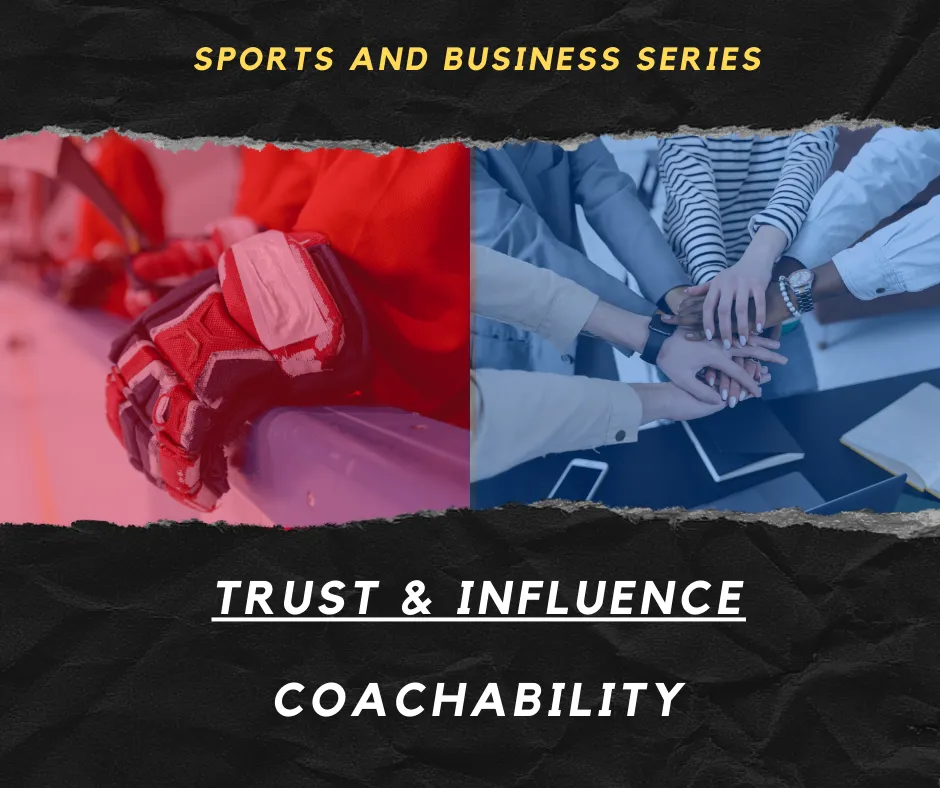
Opening Hours
Mon - Friday: 8AM - 5PM
Read More On Our Blog

Sports & Business Blog Series - Trust & Influence - Coachability
“Are you seeking higher levels of Trust & Influence within your organization? If so, how are your leaders experiencing you when it comes to coachability?
Coachability
I was planning on starting my Sports and Business blog series with the first category, Stability; however, something happened over the weekend while coaching and it highlighted the vast importance of another topic: Coachability.

The experience I had in relation to coachability over the weekend made me realize that this is a huge and very important skill for my 8- and 9-year-old hockey players to learn AND it’s an incredibly important skill in the business world. We often talk about it in terms of a growth mindset versus a fixed mindset.
But before we get into coachability and uncoachability in the sports and business worlds, let’s talk about the element that it relates to: Trust & Influence.
Trust & Influence is one of the 6 major elements I have found that play a major role in creating a healthy work environment (Back to Basics).
At the highest level, Trust and Influence can be boiled down to “no one wants to be ignored or micromanaged”.
Everyone wants to feel as if they have a say in how to complete their jobs. If they have an idea of how it can be done better, they want to be heard.
They want influence on how to do their jobs. They want to be trusted to complete their work. They want to be viewed as an individual who has valuable skills to contribute, even if they are a “mere minion” within the organization.
They have value and want to share their knowledge and contribute to bettering their team and the organization.
Again, no one wants to be ignored or micromanaged.
According to this Forbes article, “employees who feel their voice is heard are 4.6 times more likely to feel empowered to perform their best work.” Putting your employees (all of them, at all levels and experience) in the driver's seat is your best bet in getting the best out of them. When people feel heard and valued, they will perform at top notch.
Trust and Influence is a WONDERFUL thing. It can up level your people and your organization dramatically.
However, before we can be trusted and before we are ‘granted’ the power of influence, we have to show that we can perform. Our leaders need to trust us. Our leaders need to feel as if they are being listened to. Our leaders need to see and experience our coachability.
Sports
Going back to sports, I experienced both sides of the coachability spectrum this last weekend. And it changed my perspective of the players on my team. It altered my trust in them, both in a positive and in a negative way.
Currently I am coaching 8U hockey. In the state of Minnesota, 8U hockey games are mostly played at ½ ice, then, towards the end of the season, the games switch to full ice to prepare the players for the game at the 10U level, which is all full ice games.
With this change, the players are required to play at a different level. There are different rules that they need to learn, i.e. offsides and icing, which lead to different expectations and ways of playing. At this new level, playing positions takes on a much more important role, i.e. forward versus defense.
It’s a lot to take in; but within the first few games, almost all my players figured it out. There was only one major outlier, one of our most skilled players.
I could not get her to play her assigned position.
I could not get her to stop chasing the puck.
I could not get her to be aware of where she was on the ice.
I could not get her to support her teammates.
When I saw this during the game, I sat down with her, and we reviewed her position. She nodded and said “yes, I understand”. Ok, great!
However, when she stepped back out on the ice again, she went the opposite way.
I watched her and thought to myself, “ok, I need to explain it to her in a different way. Maybe she’s more visual.” I came up with another plan.
After the next shift, when she came back to the bench, I grabbed the whiteboard and we drew it up. Again, she nodded and said “yes, I understand.” Great!! I'm getting through to her. This next shift is going to be different. Then, when she stepped back out on the ice, she went the opposite way again.
Shit! Ok, let’s try a different way..... and a different way..... and a different way...... and a different way.
Over and over and over again, we did this.
Over and over and over again, I received verbal confirmation that she understood. I received head nods. She said she was listening to me. She was able to repeat back to me what she was going to do on the ice the next shift. She did so many things that verified that she understood what I was telling her.
However, time and time and time again, she stepped back out on the ice and went a different way.
OMG, what the hell!!!
I didn’t know what to do. What the hell was going on? This was one of our top players. Why was this so difficult!!
And then it struck me. Right now, she’s uncoachable. Right now, she has determined what position she is going to play, and it is not the position she was assigned. And no matter what I say to her or how I say it, she’s not going to listen.
She has determined that even though she knows what her role is, she doesn’t want to play that role, so she’s going to go and do her own thing.
It really hit home that once a player is off the bench, they (and only they), not me, their coach, get to make the decision as to how they are going to play.
I lost trust in this player. Her uncoachability vastly changed my perspective of her. Her skill level diminished in my eyes. My confidence in her abilities waned.
I looked at some of her less skilled teammates and saw them in a different light. Some of her less skilled teammates showed up as incredibly coachable. They listened to the coaches’ expectations of them. They went out and performed those expectations as best they could. They learned, developed and grew as players. With each shift you could see the learning and development.
If they made a mistake and we talked to them about it, you could see them reacting differently when that situation came up again.
My confidence in them soared. After they learned the basics of the new positions, I started to give them next level ideas to try. Next level things to consider. Next level ways for them to become more aware of themselves and their teammates.
Their skills grew in leaps and bounds in a few short games.
They are the types of players I want on my team. They are the types of players you can trust.
Ahhh, those players make me feel so much calmer!!! Refreshing!
Business
I believe that we have all run into both types of these “players” in our careers. We have run into leaders, subordinates, peers and co-workers who are coachable, and we have run into those who are uncoachable.
When coachability is not there, it is VERY apparent, and can lead to a very challenging, frustrating, and disempowering experience.
When it is there, it can lead to less skilled players becoming more successful than their more skilled counterparts.
We all know which players we want to work with. And that leads to my next question: Which player are you in your professional life?
Are you allowing yourself to be coachable?
As a coach, I can’t get on the ice and play hockey for my players. In the same way, a leader can't ‘play’ for you when you’re on your own.
Can your leaders trust you to perform?
Or have you determined how you’re going to “play” in your role and nothing anyone says to you is going to change that?
Are you showing up as uninterested in changing and growing?
Are you only interested in listening to your leaders if what they are asking of you aligns with what role you want to play versus what role they need you to play on a certain project or within a certain role?
Are you seeking higher levels of Trust & Influence within your organization? If so, how are your leaders experiencing you when it comes to coachability?
If your goal, like mine, is to not be micromanaged. If your goal is to have the trust and influence of your leaders so you can have the freedom to make your own decisions, then it might be worth asking, am I coachable?
We all know which player we want on our team. We all know which player we want to be. Are we that player?
How are we showing up for our team and how does that impact the view our leaders have of us.
Does it enhance their trust in us? Or does it decrease their trust level?
Which player are you showing up as..........
ARE WE A GOOD FIT FOR YOU?
There’s only one way to find out! Fill out the form below to start a conversation.
Tell us what you've got in mind and we'll be in touch to schedule a time to dig in a little deeper.
Copyright © 2021. Clear Simple Business, LLC. All Rights Reserved.

